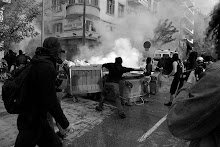Fobia del principio, Machette no. 6 9/2010
Anarchism asserted itself within the First International as a movement of revolt against the centralized, authoritarian and State-centred Marxist tendencies. Later marxism specialized in electoral politics while anarchism developed a vigorous anti-parliamentarian character. In its first decades of life, militant anarchism was a revolutionary movement advocating a social system based on libertarian communism, which was to be achieved through social revolution, i.e. through the destruction of the State and of all orders and privileges, by recourse to the direct action of individuals along with the oppressed, dispossessed masses. The project was too plain to offer anything to political calculation, too radical to allow niches to the comfortable liberalism of well-heeled revolutionaries, too intransigent to make itself available to the intrigues of opportunism. In order to be carried out, this project required that one’s ideas be resolute and steady, it required determination and unselfishness, all things that were rare among the avid crowd of political adventurers. Our first comrades were good-hearted, honest intellectuals and intelligent and generous workers, always ready, the former as well as the latter, to take up arms and struggle for the triumph of anarchy. Until the first wave of revisionism came over.
Anarchy was a great and beautiful fancy. The ultimate goal of human progress, without any doubt. But its pride and sublime negations made it inaccessible to common mortals, the ascetic intransigence of its supporters besieged any chance for action through an insuperable barrier of inhibitions, thus making them impotent, making it a monastery of a new order with neither god nor future. It was necessary to reconsider one’s positions, get rid of the rigid interpretation of principles and make contact with everyday life and all the workers. Any little exception to the ‘holy scriptures’ of anarchy would be largely offset by the results.
To present oneself as a candidate in protest – the revisionists of that time insinuated – can usefully get
our best standard bearers out from jails and islands where they have been condemned to inertia; a parliamentary mandate offers an important forum to our most intelligent members, from which they can talk to the multitudes, give incalculable propaganda advantages to our groups and the possibility to keep our ‘orators’ in perpetual circulation all over the peninsula, protected by parliamentary immunity. This is what the first to be scornful of the principles were like. By preaching independence from the inflexible chain of anarchist principles, these people ended up subjugating themselves to the anti-anarchist principles of parliamentarian socialism, which was bourgeois and monarchic.
When one slides down the slope of transition and opportunism, no matter how these are concealed by allurements, one knows where one starts off from but not always where one will end up.
Then the wave of syndicalism arrived. The pressing ‘need’ was still the same: to get out of the inertia caused by rigid coherence of principles and establish contact with the exploited and oppressed masses so that the latter could be initiated to the propaganda of the anarchist ideal. Anarchism had produced martyrs and heroes. But not everybody has got it in them to be a martyr or a hero; nor are the latter sufficient to crown social revolution with triumph. And given that at a certain moment the influence of anarchists in unions had served to oppose the degenerative progression of parliamentarian socialism, it was urgent to consolidate the positions conquered, to strengthen the presence of anarchists in the unions, to become able to direct the mass of producers towards the goals of social revolution at the right moment and according to the fundamental criteria of Anarchy.
What does it matter if the authority of leaders of crowds is required to achieve such results, if an administrative bureaucracy must be imposed, and if all the organs and functions of the State must be reproduced on a smaller scale. A ‘little’ exception to principles will be greatly compensated by immense advantages.
We have seen this. The ‘revisionists’ of anarchist principles have become the priests of the anti-anarchist principles of the State and privilege; and workers unions, which were originally libertarian in France, are today the fiercest columns of the bourgeois order.
The apostasy of the war revisionists is no less patent. They erected foul altars to the homeland on the abjuration of their internationalism, they deserted the trench of social revolution to occupy that of war imposed by the State to the profit of capitalist privilege, they abandoned the cause of the exploited and oppressed masses and embraced that of their exploiters, tyrants and executioners. No desertion could ever be more complete. Whatever they say or do to save face, they have definitively moved over to the other side of the barricade. And we will find them implacable against us in any serious circumstance, armed with acrimony and hatred. From their limbs in decomposition the supporters of the ‘popular front’ at all costs came out, in which Italian antifascism in the 1920s offers outstanding examples of foolishness: Garibaldism and the Concentration, or rather the ‘anarchist’ adhesion to Garibaldism and to the Concentration, two manifestations of one and the same recklessness. The determining reasons do not change: the ‘desire to do something’ and the pretext of maintaining contact with the masses. In vain you reminded the ‘anarchist’ Garibaldinists that Anarchy despises armies, ‘revolutions’ carried out by order of generals and ‘constituent assemblies’ elected by universal suffrage. ‘Damn principles’, they replied, ‘we stand for action and we won’t be held up by the rigour of the “sacred texts”, which are good only for you who stay watching’. After garibaldinism was revealed as a filthy plot of agent provocateurs, nobody would have wanted to embrace it. But at the time, when illusion made the heads of many swell and many others dream of medals and pensions, to have a red shirt in one’s wardrobe constituted a title of glory and a harsh rebuke to the poor fanatics who were obstinate in their faith in Anarchy. There was no action in the name of the many buffooneries that were taking place, instead there were parades, processions, proclamations, scandalous rehabilitations, the ignominious vilification of the most modest anarchist pride, of the abused fetishes of the homeland and bourgeois democracy.
Once again the grim unaccommodating anarchist principles were ‘revisited’ in order to honour the anti-anarchist principles of militarism and the State.
The deluded, humiliated for having been victims of a moment of blind collective enthusiasm, of such an ignoble fraud, mended their ways. The others, the conscientious mystifiers, those who had actually consumed the ‘revisionism’ of their ‘anarchism’ with cold calculation, moved towards the Concentration, where they gave their circus jokes a final conservative stamp.
The revisionists of a not very different species are those that came out from the magnanimous limbs of triumphant Bolshevik marxism of the first great proletarian revolution. The first outcome of this revisionism, that of the first compromises during the early period of the Moscow dictatorship, soon confused itself with the party and the government ruling Russia, and no anarchist dream ever disturbed it. As any possibility of doubt had disappeared with the massacre of all genuinely revolutionary and rebel spirits crushed by totalitarian communist despotism, they took their mask off shamelessly and sided with the winners, without pointless grimaces or false modesty.
The second outcome is that of so called ‘platformists’. Fascinated by the relative ease with which the communist party had managed to obtain and keep the upper hand, they fantasised that anarchism would follow its example with the same fortune and would eventually oust it by adopting a similar system of organization. They did not abjure their principles. They made an effort to round off the hard corners through an obscure muddle of words in their organizational program. They proclaimed the inexorable superiority of the needs of the struggle, which implied the subordination of inflexibile theoretical principles; and in practise they renounced the libertarian spirit that is the necessary essence of any anarchist movement. Instead, they proposed a hierarchical pyramid of organs and functions in which the organs and the functions of the State were revived in all their splendour.
Everywhere and at any time the same pretexts, the same roles, the same consequences. The rigidity of anarchist principles is an obstacle to fertile action. Let’s make them more malleable, let’s adapt them to the needs of our time and to the backward mentality of the masses that do not understand us! Let’s go into parliament, become priests of the homeland, party leaders… let’s become shepherds of the masses. In the name of Anarchy, let’s renounce Anarchy!
Wouldn’t it be more frank, honest and loyal if these disheartened, the tired and the opportunists were to simply declare that they had made a mistake and want to correct their mistakes? Of course, it would be more frank, honest and loyal. But there are the hypocritical trimmers, the speculators in human weaknesses, who do not care about loyalty, honesty and frankness and are only interested in fishing in troubled waters and digging insurmountable abysses of anger and hatred within the movement.



